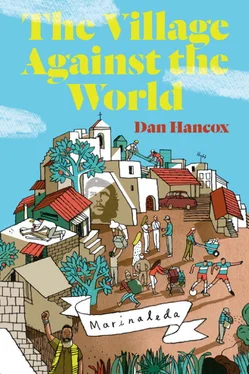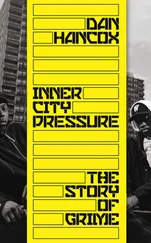As a partner organisation to SOC, this burgeoning jornaleros movement established a political party, in 1979 forming the Colectivo de Unidad de los Trabajadores (CUT): an explicitly anti-capitalist political party, positioned to the left of the Communist Party of Spain. That year, the first free local elections since the Second Republic and the Civil War were held. The CUT won 76 per cent of the vote in Marinaleda (the centre-right coalition UCD the remaining 22 per cent), and thus nine of the eleven councillors for the village’s municipal council. They have maintained an absolute majority on the council ever since.
The CUT is not a traditional communist party, according to any tradition understood outside the region. It is neither a regular Marxist-Leninist party, nor a Trotskyite or Maoist one. ‘Our union gathers people of many political stripes,’ Sánchez Gordillo explained to me, ‘but we carry the torch of anarchism’s direct action. Even the assembly is direct action.’ He went on to cite 5,000 years of Andalusian struggle for land as the psychic engine of his movement. This lineage is more important to the CUT and SOC philosophy than 1789, 1848 or 1917.
Even while participating in the standard Spanish electoral processes, Marinaleda’s relationship with representative democracy is unique. ‘When we got to the city council we realised we had to transform power – that the power that had previously worked to oppress could not also work to liberate.’ He calls this ‘counter-power’, an inversion of the existing pyramid: ‘the power of poor people against the power of the rich. For this counter-power to be effective, we realised that participation was fundamental. This is why we organised everything around an assembly – an assembly that was open to all workers, regardless of political affinity.’
For him, traditional power structures are incapable of helping the poor, as well as unwilling. One pueblo participating and reaching decisions together will make fewer mistakes than a single leader or group, Sánchez Gordillo told me – and even when they do, which they do, they are at least accountable to themselves. Their realisation in those early days, he wrote in 1985, had been that ‘laws, customs, officials, habits, budgets, regulations and standards of the Ayuntamiento’ were all instruments of power, ‘helpful to fascism, but useless as a tool of struggle and freedom for the people. That old machinery had to be destroyed.’
The assemblies became the heart of village life in the 1980s, and as a consequence, the heart of the struggle. These days they are normally attended by an average of 200–400 marinaleños and take place sporadically throughout the year. There should be approximately one per week, but it depends on what needs discussing, and how pressing it is. This ‘direct democracy’, with simple ‘hands-up’ voting, is where a great deal is discussed and decided: the budget for the town council, local rates and taxes, the election of political posts within the town, and resolutions to mobilise for more direct action.
After a decade of strikes and burgeoning labourer organisation, one event took place that drew the world’s attention to Marinaleda for the first time and became the definitive event in establishing the village’s place in modern Spanish history. In August 1980, against a backdrop of strikes across the region, Marinaleda hosted the ‘hunger strike against hunger’ – una huelga de hambre contra el hambre , in which 700 people refused food for nine days.
‘Our struggle’, Gordillo said then, ‘arises in a time when the socioeconomic situation has reached unbearable extremes.’ The village was in a truly desperate state by the summer of 1980. In the first seven months of the year they had received an equivalent of 200 pesetas per family per day – less than two euros. At best, most of the jornaleros could afford to buy only lentils, rice, onions and tomatoes from the village shops. Going two days without food so the children could eat was common, as was community solidarity: where families could share their food with one another, they did.
One story I’d heard, about a group of neighbours clubbing together to buy a gas cylinder for a family of nine to see them through the winter, was met with nods of recognition when I repeated it to other older marinaleños . That was just what you did. The week the hunger strike began, the Guardia Civil had taken nine men from Marinaleda to the police station after finding them foraging for sunflower seeds in the fields. When Sánchez Gordillo described the poverty among landless labourers in Andalusia as a ‘social holocaust’, this was the kind of thing he had in mind.
Their demand upon launching the hunger strike was for an increase in ‘community employment funds’ (essentially, paid public-works projects for the unemployed) – but this was only a short-term solution, enough to sustain them until the olive harvest came in December. The community employment funds did nothing to address the root causes of the poverty, simply subsidising and stabilising a miserable status quo with humiliating, pointless work like cleaning ditches – which in any case could be done much faster by machines. What was needed was what had always been needed: substantial land reform.
This, they argued, could be achieved through a change in the crop management of the 23,000 hectares of land between Herrera and Écija, which were planted with labour-light dry crops like corn and sunflowers. The Marinaleda proposal was to sow crops that created substantially more work, like tobacco, cotton or sugar beet, and to create secondary industries for processing them. This, they argued, would instantly lead to a 30 per cent reduction in unemployment in central Andalusia. They also proposed the reforestation of some of the village’s environs with almond and pine trees, and the construction of a dam on the Genil River to irrigate the 50,000 hectares of arid land around it.
Their demands, and their actions, were discussed and ratified by daily general assemblies, with even the children voting – because some of them, too, had volunteered to take part in the hunger strike. As media interest grew and journalists began to flock towards Marinaleda, other solidarity actions broke out elsewhere, many of them organised by the SOC, including a church occupation in nearby Morón de la Frontera, while 200 fellow jornaleros established four roadblocks on the Malaga-Seville trunk road.
‘We will continue until they know there is hunger in Andalusia’, read the El País headline on 17 August 1980, a quote from Sánchez Gordillo. It was a revealing line. The concrete demand for funds was only part of the battle: what was vital was that the rest of Spain, even the rest of the world, should be made aware of the region’s plight.
A hunger strike was both a brave and canny choice. The normal repression meted out by the Guardia Civil and the government would not work this time. You can’t arrest or beat someone for refusing food. Nothing could silence, in Sánchez Gordillo’s words, ‘the voice of hundreds of empty stomachs willing to continue, if necessary, until death’. The drama of the rhetoric reflected the desperation of the situation: Sánchez Gordillo spoke to the media in ominous tones, warning of outsiders who wished to make an example of Marinaleda, bourgeois caciques scared of these comunistas , people who dreamed of ‘turning Marinaleda into Casas Viejas’. The invocation of that tragedy was knowingly provocative, but it was justified, too.
The hunger strike was launched in August, even though (or because) the heat would be at its most punishing, peaking above thirty-eight degrees every day. August, of course, is dead time for news, and the perfect opportunity to gain national media attention for systemic, ongoing stories like poverty via high-profile acts of vanguardist protest like this one. It allowed Sánchez Gordillo to proclaim to the world that they had received ‘neither a telegram, nor a call, nor a promise’ from the out-of-touch politicians busy sunning themselves on the beach; he added that ‘the left too, are on vacation. They only come here for votes.’ The heat made it more dangerous – doctors were on hand at all times, just in case – but also all the more remarkable, that men, women and children were going without food. Every day they would meet at the assembly to decide whether to continue, and to discuss the various messages of support they had received, as well as the attempts to reach those in power.
Читать дальше












